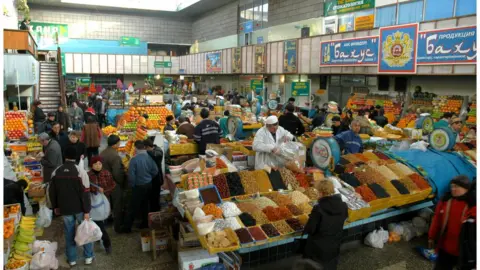How China's shaping one country's future
China's Belt and Road initiative is ploughing through central Asia. The plan, which aims to expand trade links between Asia, Africa, Europe and beyond, was unveiled in 2013. What impact has China's grand plan had so far in Kazakhstan? I went to Almaty - the financial capital - to find out.
The lyrical strains of Almaty's latest pop song reverberates through the city's main Chinese market, lending a distinctly Kazakh feel to what looks like a scene that could easily be from Beijing or Shanghai.
Inside, signs in both Mandarin and Kazakh point out directions in the warren-like maze.
It's here that I meet Huang Jie, a jovial bear of a woman. She's been running a convenience store in this market for 15 years, selling everything from hairbrushes to soy sauce.
She came to Almaty from China to take part in an ice-skating competition, but then stayed on because of the opportunities here.
"They had almost no consumer items [when I came here in 1991]," she explained.
"So we brought cosmetics, stereo sets, kids clothes, shoes... then we moved on to food, pots, kitchen utensils. And then home furniture, and now even gym equipment. We built it up step by step."
And it's been a remarkable success.
'Great for my business'
All of the products in Ms Huang's shop and in the Chinese market are from China. Most of the time she says she serves a mixture of Russian and Kazakh customers, and has learned both languages to help her sales - but increasingly she and other vendors like her in this market have been getting customers from China, thanks to the One Belt One Road initiative.
"Belt and Road has been great for my business," Ms Huang told me.
"Huge numbers of Chinese people have surged into the country to work on construction projects and build infrastructure, and they need my foodstuffs.
"When Chinese companies went to Astana to build the light railway system, a few thousand people came in. When they need to build a cement factory, there'll be another few thousand. And they cannot do without food."

Kazakhstan is sometimes euphemistically called the "buckle" in China's Belt and Road vision. It's a pivotal part of the plan.
Beijing is setting up dry ports along the borders of this land-locked country, Chinese banks have lent money to Kazakhstan and Chinese companies have been snapping up stakes in Kazakh firms.
All of this comes at a price. What does China want? Access to Kazakhstan's mineral resources for one thing. It is blessed with huge oil and gas deposits, and the Chinese are looking for a way to secure their energy needs in the future.
The investment has already yielded some very significant gains for the local Chinese business community in Almaty.
Bai Hong is chief executive of Talap Munai Services, a mining consultancy based in Almaty.
He started the business more than a decade ago after moving from China's Liaoning province. Now it does business deals worth US$200m (£157m) a year. Thanks to China's Belt and Road, he only sees that growing.
"It's already been beneficial to us," he said, whilst showing me around his new office.
"Now when we buy substances from China. Thanks to the Belt and Road initiative, the process is much faster. In the past we would need 40 to 50 days to bring just one truckload of substances here, now we can get it in 10-15 days.
"Kazakhstan has given us many preferential policies, like speeding up investment approvals and other frameworks as part of this agreement."
But with that success, has come some suspicion.

Last year, massive protests took place across the country against a controversial land reform bill - unusual in a nation where any sort of demonstration is quickly shut down or punished.
Most of the people protesting were worried that the new law would end up benefiting the Chinese more than the locals, and in the end it was shelved.
"The general population has a suspicion of Chinese investment," Kassymkhan Kapparov, director of the Bureau for Economic Research of Kazakhstan told me.
"They always think there's some strings attached to it. With the recent land reform projects, the main population were suspicious of the Chinese companies buying the land.
"The agricultural sector needs land reform but the public perception of the Chinese threat stopped the government from doing this reform."
The man in charge of Kazakhstan, Nursultan Nazarbayev, has run things here since 1989. The climbdown on the land reform bill was highly unusual for him, given dissent isn't tolerated in Kazakhstan.
But it may be a sign that he's trying to manage the growing public mistrust of the Chinese - a partnership he's cultivated and nurtured.
"The official point of view is full of beautiful statements: China is our good neighbour, our good partner, China is our future," Dosym Satpayev, director of the Risk Assessment Group told me.
"But... the ordinary people have a lot of different [opinions] about China because traditionally inside Kazakh society there are a lot of fears about China."
Despite that public perception though, China is still an increasingly important influence here.

I visited a Chinese-language school in Almaty where I saw Kazakhs of all ages - some as young as 11-years-old - arming themselves with the language they see as their ticket to a better future.
Nurzhan Baitemirov, chief executive of the East West Education Group which owns the language school, started with just one outlet back in 2007. He now runs 17 around the country and plans to open dozens more in the next few years.
"The Chinese culture and language will help Kazakhstan develop into a more sophisticated and powerful economy," he told me as he showed me around his school. "That's why our students come here."
Currently his schools teach three thousand Kazakhs across the country, but that number is expected to grow.
"I know English, and Russian, but everyone knows those languages," Alma, a student here tells me. "But if I know Chinese, a global language, then an employer will look at me twice and think 'hey, that's a good candidate!'"
Whatever the reservations, it's clear that for most Kazakhs, this new relationship with China is unlikely to change anytime soon. Kazakhstan's Chinese dreams are just beginning.
